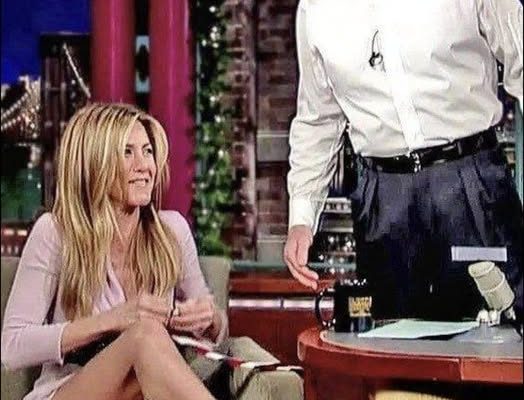For years, David Letterman reigned as the undisputed king of late-night television — quick-witted, unpredictable, and often fearless in his interviews. But as the cultural landscape shifts, many of his past interactions are being reexamined through a modern lens. What once passed as edgy humor now reads as invasive or inappropriate, especially in moments involving female guests. One of the most glaring examples involves Jennifer Aniston.
The year was 2006, and Aniston was promoting The Break-Up, her romantic comedy with Vince Vaughn. She appeared on The Late Show wearing black shorts and a flowing blouse — stylish but professional, the sort of effortless poise she’s long been known for. But the conversation that followed quickly veered into uncomfortable territory.
Instead of focusing on her film, Letterman zeroed in on her body. “That’s a tremendous outfit,” he said, staring openly. “You can only wear that if you have lovely, well-shaped, muscular, lengthy legs.”
Aniston smiled politely, doing what actresses of that era were often forced to do — laugh it off. But Letterman didn’t let it go. He doubled down, continuing to talk about her legs as the audience tittered awkwardly. “I hope somebody is TiVoing this because I can’t stop looking at this shot,” he added.
The moment was cringe-inducing then, but in hindsight, it’s downright mortifying.
Even at the time, viewers sensed the discomfort. Aniston tried to steer the conversation back toward her movie, but the host’s comments lingered, shaping the tone of the interview. Watching it now, nearly two decades later, it’s clear how normalized that kind of objectification once was — and how drastically cultural expectations have shifted since.
But that wasn’t even their most uncomfortable encounter.
In a 1998 interview, several years before The Break-Up, Letterman shocked audiences with an even more invasive stunt. As Aniston sat across from him mid-conversation, he suddenly leaned in, grabbed her head by the back of the neck, and — to her visible shock — sucked on a strand of her hair.
The audience gasped. Aniston froze, recoiling slightly, trying to laugh but clearly unsettled. Letterman, seemingly unfazed, offered her a tissue and made a joke to diffuse the tension. The clip aired, the show moved on, and for years, few questioned it.
That footage resurfaced in 2021, circulating on social media with renewed outrage. Viewers who once grew up watching Letterman’s show watched it again with fresh eyes — and couldn’t believe what they saw. Many were stunned that such a boundary-violating moment not only happened on air but was treated as entertainment.
In the late ‘90s and early 2000s, late-night talk shows operated on a different cultural wavelength. Hosts like Letterman, Jay Leno, and Conan O’Brien wielded enormous influence. Their humor often blurred the line between playful banter and inappropriate intrusion. Women in Hollywood were frequently cornered by personal or sexualized questions — about their bodies, relationships, or appearance — all under the guise of comedy.
Aniston wasn’t the only one subjected to it. Celebrities like Madonna, Janet Jackson, and Lindsay Lohan also endured interviews where the tone crossed from teasing to uncomfortable. But the repeated incidents with Aniston have become symbolic of a broader pattern — a reflection of how women were routinely put in positions where professionalism was expected, even in moments of humiliation.
Still, despite those experiences, Aniston continued to appear on The Late Show over the years. In 2008, she returned once again, this time bringing Letterman a necktie as a lighthearted gift. What followed was more suggestive banter — playful, yes, but steeped in the same dynamic that had characterized their earlier interactions.
Viewed through the lens of that era, these moments were part of a long-running act: the flustered guest, the charmingly inappropriate host. But today, audiences recognize something deeper — a normalization of discomfort, dressed up as humor.
What’s striking isn’t just Letterman’s behavior, but Aniston’s grace in handling it. Time and again, she maintained composure, smiling, laughing, redirecting. It’s a kind of emotional gymnastics that women in the spotlight have perfected for decades: staying likable under pressure, maintaining the show’s rhythm even when the host crossed lines.
It’s easy to forget how limited women’s options were in those moments. Walking off set wasn’t an option. Calling out the host risked being labeled “difficult.” The unspoken rule was clear: endure, smile, move on.
The shift in how these interviews are perceived says as much about the audience as it does about the industry. In 2006, most people shrugged it off. In 2025, the same clip plays out online as a cultural case study — an example of why conversations about power dynamics, consent, and professionalism on-screen are still necessary.
Late-night television has evolved since then. Modern hosts like Stephen Colbert, Jimmy Fallon, and Graham Norton, though not perfect, operate in a different world. There’s more awareness of boundaries, more respect for guests’ comfort, and far less tolerance for jokes that objectify or demean. Social media has made accountability immediate — what once slipped through unchallenged now gets dissected and criticized within hours.
Letterman himself has publicly expressed regret over aspects of his past behavior, especially during his later years on air and in post-retirement interviews. In several reflections, he’s acknowledged being “a different person” back then — a product of an industry that rewarded audacity more than empathy. But even remorse can’t fully erase the unease that moments like those left behind.
For Jennifer Aniston, the strange irony is that she remains one of the most poised figures in Hollywood — beloved not just for her acting but for her ability to navigate public life with dignity. In those uncomfortable interviews, she wasn’t just promoting a movie. She was surviving a cultural era that demanded women be endlessly composed in the face of disrespect.
Rewatching that 2006 interview today, it’s impossible not to feel the weight of silence between Letterman’s comments and Aniston’s strained laughter. It’s the sound of professionalism doing its job — and the sound of an era that’s thankfully ending.
In the long, uneven evolution of celebrity media, that clip stands as more than just a relic of cringe television. It’s a reminder of how far the conversation has come — and how far it still has to go.
Because what once drew laughs now draws collective discomfort, and that’s progress. The awkward smirk, the forced chuckle, the unchallenged power dynamic — all of it once defined late-night entertainment.
Now, it defines the kind of behavior we no longer find entertaining at all.


